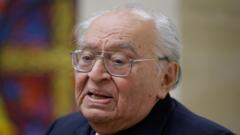Father Gustavo Gutiérrez, the Peruvian priest known for founding liberation theology—a doctrine emphasizing the Catholic Church's proactive engagement in combating poverty and injustice—has died in Lima at the age of 96. His passing reverberates throughout the sectors of faith and social activism, drawing attention to his extensive theological contributions.
Emerging into prominence with his seminal 1971 work, "Theology of Liberation," Gutiérrez's message resonated deeply in Latin America but was also met with resistance, particularly from conservative elements in the Church. Critics like Cardinal Joseph Ratzinger—later Pope Benedict—voiced concerns that Gutiérrez's ideas mirrored Marxist ideology and threatened the fabric of Church faith, labeling his approach a "fundamental threat."
In recent years, however, relations shifted positively after Pope Francis assumed the papacy. Gutiérrez expressed admiration for the current pope's commitment to a Church that prioritizes the marginalized, and in an encouraging gesture, Pope Francis acknowledged Gutiérrez's influence on the Church's mission in a heartfelt letter for his 90th birthday.
Father Gutiérrez's academic journey was diverse; before embracing the priesthood, he studied medicine and literature in Peru, and later philosophy and psychology in Europe. His introduction to Marxist theory, however, fueled critiques labeling him a communist. Nevertheless, he consistently asserted that his teachings were firmly rooted in biblical principles.
His activism became most contentious when radicalized interpretations of liberation theology aligned with revolutionary groups, such as the Sandinistas in Nicaragua. Gutiérrez argued that the Church had distanced itself from the realities faced by its community, especially in impoverished areas, leading to a misalignment in its teachings. He famously maintained that the faithful showed resounding resilience in the face of adversity, asserting, "No one is born to suffer, but to be happy."
A humble man celebrated for his approachability, Gutiérrez skillfully bridged his vocation as a theologian and his pastoral role, directly engaging with his community. His positive demeanor left a mark on many, reflecting the joy he found in serving others. Felix Grández, a sociologist and parishioner, remembered his ability to communicate complex theological concepts in relatable terms, making him beloved among the youth.
As many reflect on Gutiérrez's enduring legacy, his impact on both the Catholic Church and social justice advocacy remains evident, leaving behind a complicated but cherished historical narrative that illustrates the intersection of faith, compassion, and societal transformation.





















